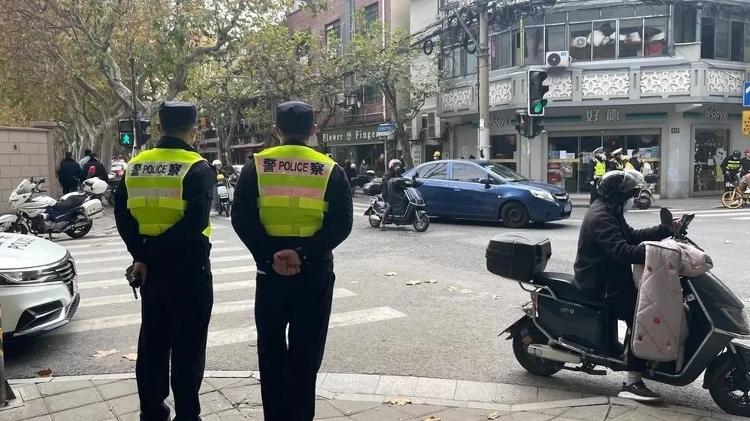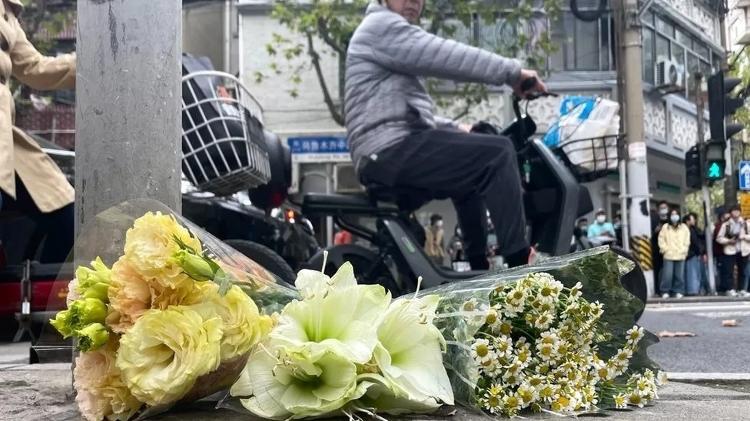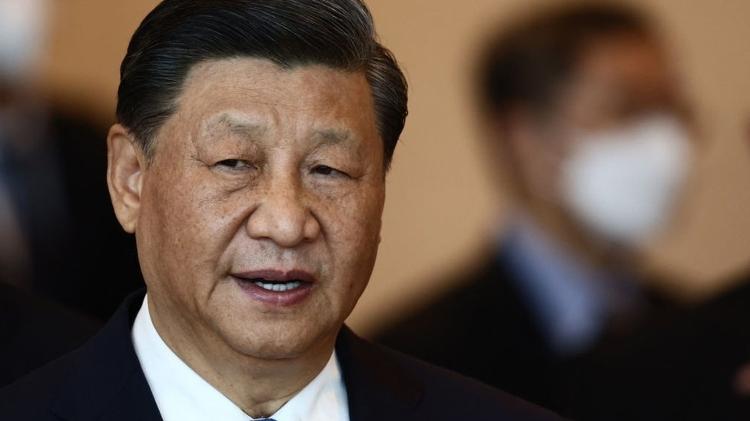Protests against Kovid restrictions in China intensified this weekend after 10 people died in an apartment fire in Urumqi, the capital of the Xinjiang Uyghur autonomous region in the west of the country.
Thousands took to the streets of Shanghai to commemorate the victims and protest the restrictions. Many of those present demanded President Xi Jinping’s resignation.
The BBC witnessed at least three people being taken away in police cars.
Many point to confinement in buildings as the cause of fire deaths.
While Chinese officials denied that this was the reason, Urumqi officials issued a rare apology on Friday, promising to “restore order” by gradually lifting restrictions.
“Xi Jinping resign”
The protest in Shanghai, China’s largest city and the world’s financial center, saw some people lighting candles and laying flowers for the victims.
Others chanted slogans such as “Xi Jinping resign” and “Communist Party resign”. Some also held blank banners.
Demonstrations like this are rare in China, where any direct criticism of the government and president can result in harsh reprisals.
One protester told the BBC he was “shocked and excited” to see people on the streets, saying it was the first time he had seen large-scale opposition in China.
He also said the quarantines made him “sad, angry and hopeless” and prevented him from seeing his sick mother, who was undergoing cancer treatment.
Another protester told the BBC that officers were asked what they thought about the protests and the answer was “like you”. However, he added, “they’re wearing their uniforms, so they’re doing their job.”
Some protesters reported the violence, one telling the AP news agency that a friend was attacked by the police at the scene, while the other two were sprayed with tear gas.
police presence
As the situation in the area calmed down this morning, the BBC noted an increased police presence in the protest area, with several dozen police, private security and plainclothes police roaming the streets.
Elsewhere, photos and videos of students protesting Saturday night at several Chinese universities circulated on social media. Most of the protesters seemed to have gathered at Nanjing Communication University.
Videos of protests are difficult to independently verify, but many contain outspoken and overt criticisms of the government and its leader.
unusual protests
The protests are the latest in a series of demonstrations against China’s “covid zero” measures.
These protests have become increasingly bold in their criticism of both the government and President Xi Jinping.
The Covid-zero strategy is the latest of its kind among the world’s major economies, and is due in part to China’s relatively low levels of vaccination and efforts to protect the elderly.
Last-minute lockdowns have sparked anger across the country, and wider restrictions have sparked violent protests from Zhengzhou to Guangzhou in recent times.
Despite strict measures, the number of cases in China this week reached an all-time high since the start of the pandemic.
Analysis by BBC Asia Digital Correspondent Tessa Wong
The Urumqi fire was by some accounts a nightmare scenario for many Chinese who have found themselves under widespread restrictions in recent months.
Authorities disputed these allegations, but this did not prevent public anger and concern from spreading.
The incident marked the final tipping point in China’s growing frustration. Millions are fed up with three years of movement restrictions and daily covid tests.
Anger spread to every corner of China, from major cities to remote areas such as Xinjiang and Tibet, and mobilized all segments of society, including university students, factory workers, and ordinary citizens.
As this anger grows, protests against Covid measures are becoming more and more common. But even this weekend’s demonstrations in this new normal are unusual in both the number and the frankness of their criticism of the government and President Xi Jinping.
Taking to the streets en masse with hundreds of people demanding President Xi’s resignation was unthinkable until recently.
But after a recent dramatic protest on the Beijing bridge that shocked many, a precedent seems to have been set for more open and strong opposition to be expressed.
Others chose to wave the Chinese flag and sing the national anthem, whose lyrics champion revolutionary ideals and encourage people to “stand up, stand up.”
This is a show of patriotism that can be read as an expression of solidarity with Chinese citizens suffering from Xi’s Covid-zero policy and a call to action.
source: Noticias
Mark Jones is a world traveler and journalist for News Rebeat. With a curious mind and a love of adventure, Mark brings a unique perspective to the latest global events and provides in-depth and thought-provoking coverage of the world at large.


